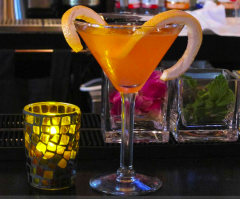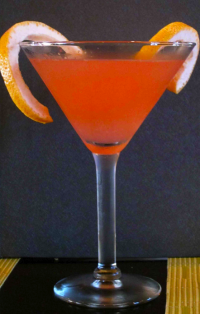Theme Essay by Bianca Garcia
Writers Are Narcissistic—and What's Wrong With That?
I love vanity—LOVE it! I love paying attention to myself. I want people to see me, to be impressed by me, to listen to me....
Just because I’m vain doesn’t mean I’m overly self-involved. When critics decry the “narcissism” or “self-confessional” quality of any piece of writing, the implication is that it’s wrong to care about what impact you make on the world. My response? All writers need to understand themselves in order to write well, whether they’re discussing a personal trauma, colored jeans, or the war in Afghanistan.
So, let’s talk about how vanity can help us—or at least the way it’s helped me.
When I began my food blog in 2008, I just wanted to indulge my love for writing (or, mostly, gabbing), and to share my lifestyle interests in food, fashion, and fitness.
Certainly, I was vain—all bloggers are. We blog to carve out our own space on the Internet. We want to have our voices heard; we want to share our stories. We want to follow each recipe in a Julia Child cookbook, then write a book that gets turned into a movie. Our blogger egos are stroked by how people react to our posts—by the number of comments, compliments, complaints, emails, questions, Facebook likes, pins, retweets.
But I have to ask: What’s wrong with that? I work hard for the attention. I write draft after draft, pick the best pictures to highlight my points, obsess about opening lines and closings, and check grammar incessantly. I want what I write to reflect who I am—or at least the self I want to be: smart, warm, witty, just the right amount of sass, just the right level of seriousness.
As I write each post, I’m always conscious that I’m building a persona. All writers who talk about themselves in print have personas. We shape the personal stories we tell. That doesn’t mean we’re being inauthentic, but even the rawest blog post has to be selective. We aren’t simply recording our actions and feelings every second of the day. (And for those who literally provide the public with a running stream of iPhone shots of their daily lives, I have to wonder: How vain is that?)
From the start of my blog, my biggest fear was that my persona would be misunderstood. I had my eye on achieving a certain kind of writing success with a given audience. But I knew that if my intended audience questioned my writing persona, I was in trouble.
So, in 2010, along came this email comment from an anonymous reader that really bothered me: “Hi Bianca, how are you? I have the same chocolate obsession, and I enjoy reading your posts. But I am concerned. Do you have a boyfriend?”
Why was she (for some reason, I think it’s a woman) concerned about my relationship status? Did she think I was whipping up plate after plate of pasta and dessert, then eating it all by myself? (Not true, by the way.) Was she worried because I regale my readers with tales of my Friday nights spent at home doing laundry and FaceTime-ing with my parents? (So true.) Or—horrors—was she concerned because I sounded like a sad, lonely, single writer, rhapsodizing about my baked goods and comparing cookies to relationships, asking rhetorical questions like a hungry Carrie Bradshaw?
Uh-oh.
Here’s where vanity came to my rescue. My persona is not that of a sad, lonely, single writer—that’s just not my shtick. I am a giggly and cheerful food blogger with a healthy dating life. But vanity focuses you on what other people think, and if you want readers to be avid followers of your wonderful and delightful life narrative (rather than “concerned”), you need to be clear about why you’re writing.
This reader, for instance, made me realize that I share more than my love of eating and good recipes in my food blog. All along, it felt natural to sprinkle in stories about other aspects of my life, including relationships.
But I used to cherry-pick the experiences I wrote about: a recipe for a decadent chocolate cake, a triumph in running a road race, that one time I got asked out on a date by someone ten years my junior. On my blog, these became forever immortalized, for my readers and me to admire. Now, however, I also write about the experiences I’m not so proud of—the kitchen fails and injuries and heartbreaks.

For the past two years, I’ve become more intentional about what I’m doing. I’ve written posts about my sisters, friends from high school, my grandfather, and, yes, even an ex-boyfriend.
At first, I just gingerly mentioned that I was going through a breakup. Eventually, I wrote a more serious piece about love and loss (and spaghetti) for Talking Writing, which I then republished on my blog.
I don’t write about every single bad thing, because I still tailor my adventures to my readers. I’m writing a food blog, not a diary.
It’s also true that blogging and memoir writing raise pesky questions about truth. Vanity spurred my desire to strut my stuff in public, no question. But to my pleasant surprise, I’ve gained a stronger following since I began including more personally revealing anecdotes, especially those in which I’m not just boasting about a glamorous date.
I’ve remained true to myself—and I love it.
Maybe it did take Vain Old Me awhile to realize that admitting to failure helps readers relate to a writer. Does putting it this way sound artificial? Vain New Me says self-awareness on the part of writers is just part of the mix, along with honesty, passion, and comic exaggeration. It’s why the very artificiality of vanity has helped me to stay real.
And it’s why, when I recently found myself drinking at Church and was presented with the Seven Deadly Sins, I chose Vanity, my favorite sin.
By “Church” I mean a restaurant in Boston, not the House of God. Its cocktails are named after the deadly sins and the four horsemen of the apocalypse, but I hardly needed to read the descriptions of each to know what I wanted. And, oh, how I savored my Vanity cocktail made with vodka and fresh-squeezed, sweetened ruby-red grapefruit!
It was just the kind of drink I like: sweet and strong. And pretty.
Publication Information
- “Strawberry Shortcake Cookies (Or: Almost a Kitchen Fail)” by Bianca Garcia, Confessions of a Chocoholic, April 29, 2012.
- “Love, Loss, and Spaghetti” by Bianca Garcia, Talking Writing, November/December 2011.
- Photos of the "Vanity" cocktail are by Rina Peselman and used by permission of Church of Boston. Click here to find out more about Church's "Seven Deadly Sins."
Art Information
- "Vanity" and "Vanity at the Bar" by Rina Peselman © Church of Boston; used by permission
Bianca Garcia is a social media consultant at Talking Writing. You’ll find many more food adventures on her blog, Confessions of a Chocoholic.
“Admiring my colorful pasta, I was reminded of pancit Malabon, a noodle dish from the Filipino town where my lolo and I grew up. He and I used to eat it as we sat side by side. As those long-ago days in the Philippines came back to me, I realized that memories can carry you forward rather than cementing you in the past.” —“Love, Loss, and Spaghetti”


